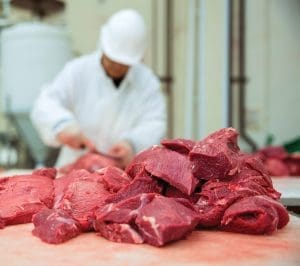By Megan Webb, Ph.D., Contributing Editor
During morning chores, the sunrise reminds me to be thankful for a new day, a new bounty of hope, and the chance that we will prevail through the pandemic. If we can remain confident that we are in this together, fear and greed will diminish, along with accusations among the supply chain. It is incredibly unfortunate the there is a tremendous supply of high-quality, potentially oversized cattle with no harvest destination. Feeders and nutritionists are working together to slow gains in an attempt to minimize fat accumulation and potential Yield Grade 4 and 5 carcasses on the rail.
Some local meat lockers offer harvest opportunities; however, most harvest small volumes of cattle weekly and certainly cannot operate at the same chain speed as the major beef packers. If producers were able to schedule harvest dates early enough, some cattle may be processed locally, providing freezer beef to be sold off the ranch or feedyard. At this time, many local lockers are booked for the rest of the year. Undoubtedly, beef processing by the major packers with partial capacity is causing frequent disruptions in the supply chain, leaving many further processors, supermarkets and food club distributors struggling to meet minimal retail orders, resulting in partially empty meat cases.
Disruptions in the supply chain have diminished margins for producers and cattle feeders in particular. As cattle producers, we are accustomed to challenges and unique considerations such as how we raise our cattle, manage our business and market our product, but we have been presented a new challenge of managing for “maintenance” to survive economically. Fortunately for beef, unlike other proteins, capacity has been running above 65 percent and euthanasia has been very minor relative to pork. Undoubtedly, this virus has caused a shortage in the meat case, but many experts believe it will be temporary!
The silver lining is that agriculture has been deemed “essential” by the U.S. Department of Homeland Security and is now in the spotlight for all Americans. Early in April, producers received some reward from strong consumer demand, mainly out of fear and over purchasing that resulted in slightly elevated cattle prices. Out of this demand, some packing facilities even added a day to their weekly shifts as the food security concern intensified.
Regardless of this movement, the virus is one that spreads fast and is resilient, like an invasive species. Many major packers idled for a few days to a few weeks to conduct deep cleaning, keep their workers safe, and arrange for more social distance abidance among break rooms, workstations and gathering places. Fortunately, on April 28, President Trump signed an executive order to tighten up supply-chain disruptions and decrease protein shortages in American grocery stores. Within the Defense Production Act, meat processing is defined as a “critical infrastructure,” and this will aid in keeping production plants open and provide heroic plant employees with the personal protective equipment they need.
“Our nation’s meat and poultry processing facilities play an integral role in the continuity of our food supply chain,” says U.S. Agriculture Sec. Sonny Perdue. Beef producers are feeling the critical role that processing plant employees have in the supply chain and, unfortunately, the bottleneck when the supply chain becomes fragmented.
To keep processing plant employees safe, the Centers for Disease Control and Prevention (CDC) of the Department of Health and Human Services and the Occupational Safety and Health Administration (OSHA) of the Department of Labor are providing guidance to ensure operational strategies and safe facilities. Certainly, the order does not force employees to show up to work, but if they feel safe doing so, America’s protein supply can be secured. This order will work to close gaps in the supply chain disruption and give the American people the comfort they need to focus on reopening the nation.
For livestock producers, there is no doubt that COVID-19 has caused and will continue to have disastrous impacts in the protein sector, American businesses, and rural and suburban economies. The federal government has issued the CARES Act, which contains $376 billion in relief for American workers and small businesses. The Small Business Administration is accepting new Economic Injury Disaster Loan (EIDL) and EIDL Advance applications to provide relief to U.S. agricultural businesses at https://covid19relief.sba.gov/#/. Hopefully more programs will become available to assist agriculturalists who continue to suffer from the loss of profitability during these unprecedented times.
As the sun is setting on the horizon, I hold hope in my heart that we serve as “one nation under God, indivisible, with liberty and justice for all.” If we can be innovative or manage for maintenance, the livestock industry will prevail during this long haul.






